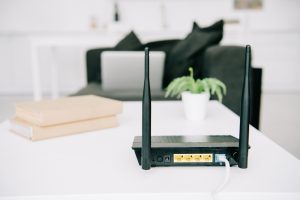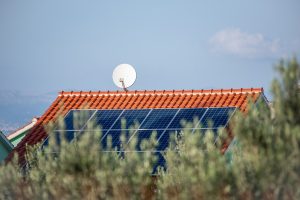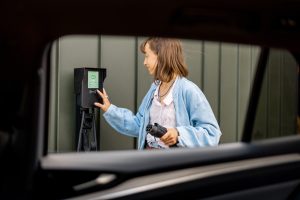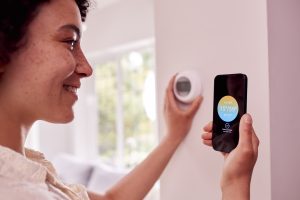Many homeowners are thinking about getting solar panels. They look at their rising energy bills and wonder if solar power could help. At Martin Kaine Electrical, we often get asked whether solar panels are a good investment. The answer isn’t the same for everyone, so let’s look at what you need to know.
How Do Solar Panels Work?
Solar panels are quite simple. They capture sunlight and turn it into electricity that you can use in your home. The panels go on your roof where they can get the most sun. They connect to a device called an inverter that changes the electricity into the right type for your home appliances.
When your panels make more electricity than you’re using, the extra power can either:
- Feed back into the national grid (and you might get paid for this)
- Charge a battery system (if you have one installed) for use later
The Benefits of Solar Panels
Lower Energy Bills
The most obvious benefit is paying less for electricity. Once installed, your solar panels generate free electricity whenever the sun is shining. This can cut your bills significantly, especially during summer months.
Income from Excess Energy
Through the Smart Export Guarantee (SEG), energy suppliers must pay you for extra electricity you send to the grid. While the rates aren’t as generous as older schemes, it’s still money back in your pocket.
Reduced Carbon Footprint
Solar panels don’t release any carbon when generating electricity. By using solar power instead of energy from fossil fuels, a typical home system could save about 1.5-2 tonnes of carbon per year.
Energy Independence
With solar panels, you’re less affected by energy price rises. Add a battery storage system, and you can use your own electricity even when the sun isn’t shining.
Added Home Value
Some studies show that homes with solar panels sell for more than similar homes without them. Buyers are often willing to pay extra for a home with lower running costs.
The Drawbacks to Consider
Upfront Cost
The biggest hurdle for most people is the initial cost. A typical system for a three-bedroom house costs between £4,000-£6,000. This is much less than ten years ago, but still a significant investment.
Long Payback Time
It takes time to recover your investment through savings. In the UK, payback periods typically range from 10-15 years, depending on your energy use and system size.
Roof Requirements
You need enough roof space that faces the right direction (ideally south) without too much shade. Not all homes have suitable roofs for solar panels.
Weather Dependence
The UK isn’t famous for constant sunshine. Your system will generate less electricity on cloudy days and during winter months when days are shorter.
Maintenance Considerations
Solar panels need little maintenance, but they do need occasional cleaning and checking. Inverters typically need replacing after 10-15 years, which adds to the lifetime cost.
Is Your Home Suitable?
Before thinking about costs and benefits, check if your home is right for solar panels:
- Roof direction: South-facing is best, but east or west can work too
- Roof angle: Around 30-40 degrees is ideal
- Shade: Trees, chimneys or nearby buildings that cast shadows reduce efficiency
- Roof space: You need about 15-20 square metres for a typical system
- Roof condition: Your roof should be in good repair and strong enough to hold the panels
- Planning permission: Most residential installations don’t need planning permission, but listed buildings or homes in conservation areas might
The Financial Case
Let’s look at some rough numbers for a typical 3.5kW system:
- Installation cost: About £5,000
- Annual savings on electricity bills: £300-£500
- Income from selling excess power: £50-£100 per year
- Maintenance costs: Around £150 every few years
Based on these figures, you might save and earn around £400-£600 per year. This means the system could pay for itself in 10-15 years, while the panels typically last 25-30 years.
Beyond the Numbers
The decision isn’t just about money. Consider these other factors:
- Future energy prices: If energy costs keep rising, solar becomes more valuable
- Home improvements: If you’re already doing roof work, adding solar panels at the same time can reduce overall costs
- Environmental values: Some homeowners choose solar mainly for environmental reasons
- Energy security: Solar with battery storage gives you power even during grid outages
- Government policy: Future incentives could improve the financial case
Battery Storage: Worth the Extra Cost?
Adding battery storage lets you use solar electricity even when the sun isn’t shining. A typical battery system costs £2,000-£4,000 extra.
This makes financial sense if:
- You’re often out during the day when panels generate most power
- You use a lot of electricity in the evening
- You want backup power during outages
- You’re looking for maximum energy independence
Making Your Decision
To decide if solar is right for you:
- Get a proper survey: A good installer will check your roof and energy use before recommending a system size
- Ask for projections: They should show estimated generation and savings based on your specific situation
- Get multiple quotes: Prices and advice vary between companies
- Check installer credentials: Make sure they’re MCS certified and part of a consumer protection scheme
- Consider timing: Combining solar installation with other home improvements might save money
Next Steps
If you’re interested in solar panels, the first step is to get a professional assessment. At Martin Kaine Electrical, we can:
- Evaluate your home’s suitability
- Recommend the right system size for your needs
- Provide clear information about costs and benefits
- Handle the entire installation process if you decide to go ahead
- Make sure everything is safely connected to your home’s electrical system
Solar panels aren’t right for every home, but for many people, they offer a good long-term investment that helps both your wallet and the planet.
Contact us today for honest, straightforward advice about whether solar panels would work for your home.




